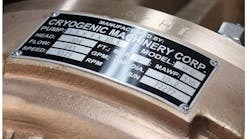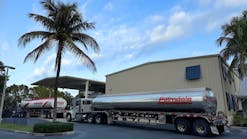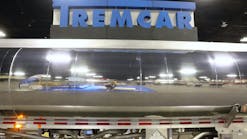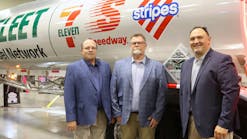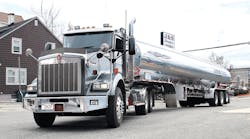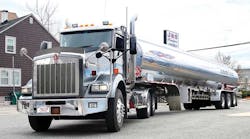For more than 20 years, J&S Transport has been building success one step at a time
ANNUAL business growth often comes one tractor-trailer rig at a time for Lynn, Massachusetts-based petroleum hauler J&S Transport Co Inc. However, that is a significant increase on a percentage basis for the small regional New England fuel hauler.
J&S Transport currently runs 12 transports and has plans to add up to two new petroleum transports for business expansion in 2015. Each new transport also means three new jobs for tank truck drivers. The carrier hauled 145 million gallons of refined fuels in 2014 with 10 transports, and annual revenue per transport $450,000.
“We’ve already bought three new tractors this year—two for replacement and one for growth—and one new petroleum trailer,” says John Hamel, president of J&S Transport. “The economy looks pretty good for us right now. If we can find well qualified drivers, we could add as many as two transports this year. Gallons were up close to 16% for the first quarter of 2015, and we believe we will haul around 160 million gallons this year.”
The strong start for the year came despite one of the worst winters the Boston area has experienced. Snowfall for the winter was nearly 111 inches. The snow and extreme cold were tough on drivers and equipment, and the carrier actually shut down for one day each during the two worst storms. Hours of service exemptions were in place from late January into March.
Solid clients
Established in 1992, J&S Transport serves customers throughout Massachusetts and New Hampshire. Although being one of the most difficult operating environments, the greater Boston area remains a key focus for the company.
J&S Transport is very much a family-owned business. The “J” in the name stands for John, and the “S” is his wife Sharon, who is vice-president of J&S Transport. Two of their daughters also work for the company—Amanda is lead dispatcher, and Samantha is administrative assistant. Bob Hoyt, Sharon’s brother, is operations manager.
In the early days, the operation was run from the Hamel home in Lynn, so Amanda and Samantha had ample opportunity to see the company evolve. Tractor and trailer parking space was leased at the same location where the company is based today—12 Washington St in Lynn.
John had grown up in the fuel hauling business. His father—John—drove for Sinclair Oil and then Suffolk Trucking in Revere, Massachusetts. Then in 1980, his father and a partner launched Mass Petroleum Lines. At its peak, the tank truck carrier ran 30 tractors and 40 trailers.
Time of truth
John worked at Mass Petroleum Lines from the time he was a teenager, helping out around the terminal and then driving, dispatching, and filling in for his father as needed. An economic downturn in the early 1990s hit the carrier hard, and Mass Petroleum Lines shut down in February 1992.
“This was a moment of truth,” Sharon says. “We needed to do something quickly to provide an income. We had children, and we needed to be able to feed and clothe them and keep a roof over our heads. John looked at several options, but it made sense for him to keep working in the business he knew best.”
Rather than John going to drive for another fleet, they decided to start their own business from scratch. John first secured a commitment for a $7,500 loan, and he asked the local Ryder System if that would be enough to secure a lease for a tractor.
“That $7,500 loan was all the cash we had,” he says.
Next he approached Mutual Oil Co, a petroleum marketer and convenience store operator, and asked if they would give him loads. They agreed.
Finally, John met with the owners of Quality Trucking in Revere. “I proposed that if they would let us use a petroleum trailer and their authority, we would pay them 20.6% of the revenue we generated,” he says. “Sharon and I would arrange and dispatch our own loads.”
New beginning
With all of the pieces finally in place, J&S Transport commenced operations in October 1992. John and two other drivers made sure that one petroleum transport was on the road 24 hours a day and almost seven days a week. “We only shut down Sunday nights,” says Sharon, who handled dispatching duties and took customer calls.
Still running just a single petroleum transport, the company incorporated in 1994. John and Sharon parted ways with Quality Trucking on good terms, and the Quality Trucking owners sold them a 1987 Fruehauf MC306 petroleum trailer with a 12,500-gallon capacity.
“Our biggest objective as we built this company was to ensure that we didn’t make the same mistakes that brought down my father’s company,” John says. “We paid close attention to the financials. We made safety our number one priority, and we treated drivers with respect from the outset.”
While J&S Transport added customers during the early years, the owners were reluctant to add vehicles. “We were very careful,” Sharon says. “We remembered the tough financial conditions when we started.”
By 2001, J&S Transport was serving four fuel shippers, including Best petroleum which eventually partnered with Sunoco opening a new door for J&S Transport. The Hamels realized it was time to expand. In the fourth quarter of that year, they added a second petroleum transport. A third transport was acquired in 2002, and more customers came on board.
“We added about a truck a year after that,” John says. “Each new transport generated jobs for roughly 2½ more drivers. We never added a truck unless we had a new client or new business. We were very selective about which opportunities we took on.”
House carrier
In 2003, J&S Transport became Sunoco’s house carrier for all of Massachusetts and New Hampshire. This means J&S Transport gets first call for loads out of Sunoco’s Revere terminal after Sunoco’s own fleet.
“They audit us every three years, and it is a very thorough audit,” John says. “The Sunoco audit can be even tougher than the US Department of Transportation safety audit.”
Always concerned about where his operation stacked up in safety, John went to DOT and requested a safety audit in 2006. “I wanted to make sure we were doing everything properly,” he says. “All they found were a few minor paperwork issues. I felt much better after that.”
Also in 2006, the company joined National Tank Truck Carriers. The company also joined the American Trucking Associations and the Massachusetts Motor Trucking Association at about the same time.
Involvement in those associations increased significantly when John stopped driving full time in 2007. “I became much more active in MMTA in particular after Boston enacted very restrictive hazmat routing rules,” he says. “Even after the restrictions were put in place, I continued sending my trucks through Boston. They were ticketed, and I made dozens of court appearances.”
Fighting the citations on the grounds that the city ordinance was in violation of federal rules, John was able to get all of the tickets dismissed in Magistrate Court. Only six of the citations required attorney representation. J&S Transport paid no fines.
Eventually, the Department of Transportation preempted the Boston hazmat route restrictions, and the city was forced to do a route study. Not surprisingly, the city came up with a very restrictive route plan that is still in effect today.
MMTA worked with the Massachusetts State House and Senate to approve funding for a regional transportation study to propose more realistic routing guidelines. However, the Massachusetts Department of Transport never put out a bid to launch the study.
“The fight goes on,” says John, who continues to be very active in the MMTA. Currently, he is serving a two-year term as chairman of the association, and he discussed the latest on the Boston hazmat routing issue during the 2015 NTTC annual conference, which was held in Boston in late April.
Safety program
For much of J&S Transport’s young history, the Hamel’s outsourced safety and compliance management to a third-party contractor. “We just didn’t have the time and resources to do those functions in-house, and we didn’t want to cut corners,” John says. “We finally built up our operation to the point that we were able to hire our own safety director in 2009.”
Then in 2011, Steve Powers came on board as a Certified Director of Safety (CDS) and has been managing the program since. With the Hamels’ encouragement, Powers serves as Region I chairman for the NTTC Safety and Security Council, sits on the MMTA’s board of directors, serves as chairman of the 2015 MA TDC Committee, serves as co-chairman of the MMTA Safety & Compliance Committee, and serves as Sector Chief of the Transportation Critical Infrastructure Sector with the Boston-InfraGard while sitting on their board of directors, as well.
The focus on safety can be seen in every part of the operation, starting with drivers. As a smaller carrier with minimal turnover, the management team has the ability to hand-select every new hire.
“We have to hire three drivers with each new truck we added to the fleet, and it can be a challenge,” John says. “We have trouble finding drivers, just like the larger fleets. We’ve hired some ex-military drivers in the past could of years, and we have hired some freight drivers. The biggest drawback is that our new guys start out driving nights and weekends.
“At the same time, we’ve tried to make the job as attractive as possible by paying hourly wages. We provide uniforms, and we offer good benefits with healthcare coverage and a 401 K plan with weekly deposits.”
Keeping drivers happy means keeping them busy. Drivers make two to four deliveries per shift. The load assignment and dispatch functions are handled through Total Dispatch, a software product developed by Creative Energies, a company that focuses on smaller fuel haulers. The all-in-one system is a complete package dispatch to back office functions, and the data is shared across the platform.
Dispatch operations communicate with drivers through Reltima on-board computers in the tractors.
“This system gives us plenty of capabilities,” Sharon says. “It provides password-protected customer access to load status and billing. It gives us inventory management capabilities. It provides our management team with detailed, color-coded information on every driver and every truck. The on-board computers provide electronic driver logs and vehicle inspection reports.”
New tractors
Drivers are assigned to late model tractors. The fleet had been running Kenworth T800s, but the latest purchases were for Freightliner Cascadias. The newest tractors have Detroit DD16 engines rated at 485 horsepower, Eaton Fuller UltraShift Plus transmissions, and fully locking Meritor tandem drive axles rated for 46,000 pounds.
Safety-related equipment includes Meritor’s On-Guard collision avoidance radar, WABCO anti-lock braking, Bendix air disc brakes on the steer axle, and Cat’s Eye tire-pressure monitoring. Jost fixed-position fifthwheels are standard equipment.
J&S Transport had been running widebase single drive tires on tractors since 2004, but the carrier is moving back to duals. “We simply need more traction in the mountains during the winter,” John says.
None of the tractors in the fleet have product pumps. Instead, the company dispatches a pickup truck with a 16-ft utility trailer when c-store storage tank pump-outs are required. The trailer contains two Gorman Rupp pumps, one a two-inch, the other a three-inch. The two-inch pump has a gasoline engine, and the three-inch pump has a diesel motor.
Petroleum trailers
The fleet runs primarily Heil petroleum trailers with 11,500- or 12,500-gallon capacities. All are three-axle trailers. The smaller capacity trailers are needed for New Hampshire, which a lower maximum gross combination weight than Massachusetts.
All of the trailer purchases have a 102-inch axle width, which provides a lower center of gravity. Civacon provides most of the tank hardware, including bottom loading system, internal valves, domelids, and overfill protection.
“We’ve been working with Civacon as a test facility for thier COPS (Cross-Over Prevention System) since 2014, and we have it on three of our newest trailers,” John says.
Truck-Lite LED work lights are used throughout the trailers. Product hoses are from Goodyear, and New Pig supplies the spill containment and sewer cover kit. The Jost landing gear has 10” x 12” sand shoes. Running gear includes the Hendrickson Intraax air suspension system, WABCO RSS Plus roll stability, and 455/22.5 Michelin X One widebase singles.
J&S Transport operates out of approximately a 1.5-acre facility in Lynn. A 1940s-era service station on the site was renovated to become the company office. The side of a hill was excavated to provide enough parking for the entire fleet, and more excavation will be done in coming months to make room for construction of a maintenance shop.
“Currently, our two mechanics handle vehicle repairs in a tent that serves as our temporary shop,” John. “We’re continuing to expand and build out operation one step at a time. We’re definitely planning for the future, and the next generation of leadership is already in place.” ♦





